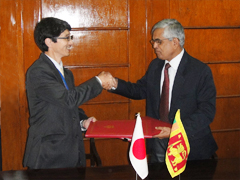[Ministry of Foreign Affairs of Japan] [Tuesday, Aug 4, 2015]
Japan-Italy Summit Meeting
On August 3, commencing at 6:45 p.m. until 7:30 p.m., Mr. Shinzo Abe, Prime Minister of Japan, held a summit meeting with H.E. Mr. Matteo Renzi, Prime Minister of the Italian Republic, who was making an official working visit to Japan. The overview is as follows.
1. Opening Remarks
(1) Prime Minister Abe welcomed the visit to Japan by Prime Minister Renzi, who is a close friend of Prime Minister Abe, and congratulated him on the great success of the Milan Expo. Prime Minister Abe also stated that Japan would serve as the chair country of the G7 Summit next year and Italy would do so the year after that, and said that he intended to utilize this visit by Prime Minister Renzi and the 150th anniversary of the establishment of the diplomatic relations between Japan and Italy next year as opportunities for deepening the Japan-Italy relations in a broad range of fields.
(2) In response, Prime Minister Renzi stated that he was happy to be able to realize this visit to Japan, the goal of which was to strengthen the bilateral relationship, and hoped to visit Japan again on occasions such as the G7 next year and the 2020 Tokyo Olympics. Furthermore, Prime Minister Renzi expressed gratitude for the attendance of Prime Minister Abe’s spouse to the Milan Expo, and he hoped Prime Minister Abe would also visit Italy.
(3) The two leaders affirmed that they would coordinate and cooperate toward the success of the Ise-Shima Summit and the 150th anniversary of the establishment of the diplomatic relations between Japan and Italy next year.
2. Bilateral Relations
(1) Prime Minister Abe explained his growth strategy and emphasized that Japan had returned as a country which can enjoy growth, and Prime Minister Renzi noted that the two countries were similar in terms of attaching importance to promoting growth. The two leaders appreciated each other’s efforts, while affirming that both countries would contribute to the global economy through their economic growth.
(2) Prime Minister Abe welcomed the deepening of cooperation between the two countries in the economic field, including the holding of business discussions by mid-tier enterprises as well as small and medium-sized enterprises at the Milan Expo. He further stated that he hoped to expand cooperation between companies at the Italy-Japan Business Group meeting with high-level participation. In response, Prime Minister Renzi showed his support for the idea, and stated that he intended to dispatch a high-level delegation.
(3) Prime Minister Abe mentioned that there are 40 sister-city relationships between Japan and Italy, and this year marks the 50th anniversary of the establishment of the sister city relations between Kyoto City and Florence, where Prime Minister Renzi was once mayor. He also expressed hope that tourism exchanges would expand between Japan and Italy, which was specified as an important market in the Visit Japan Promotion in April. In response, Prime Minister Renzi expressed expectation that tourism activity between the two countries would further intensify.
3. The Relationship with the European Union (EU)
(1) The two leaders affirmed that they will both make the greatest possible effort to try to achieve an agreement in principle on the Japan-EU Economic Partnership Agreement (EPA) during this year, as well as the early conclusion of the Japan-EU Strategic Partnership Agreement (SPA).
(2) Prime Minister Abe requested Italy’s cooperation on abolishing or easing restrictions on importing food and other items produced in Fukushima Prefecture. Prime Minister Renzi explained that basically it was an EU issue, but that Italy also intended to make efforts as much as it can.
(3) The two leaders also exchanged views on the problem of Greece.
4. Politics and Security
(1) Prime Minister Abe explained that the “Legislation for Peace and Security”, which puts “Proactive Contribution to Peace” based on the principle of international cooperation into practice, and Prime Minister Renzi expressed support for Japan’s initiatives.
(2) The two leaders welcomed the agreement that had been reached on the substance on the Agreement between the Government of Japan and the Government of the Italian Republic on the Security of Information (http://www.mofa.go.jp/mofaj/press/release/press4_002365.html) which would contribute to further strengthening security cooperation between the two countries, and affirmed that they would cooperate toward the early conclusion of the Agreement.
5. Regional Affairs
(1) The two leaders affirmed that thorough adherence to the rule of law at sea, including in East Asia and the Mediterranean Sea, is in the common interests of Japan and Italy, and confirmed their coordination for that purpose.
(2) The two leaders also exchanged views on the Russia-Ukraine situations. They affirmed that any compromise would not be possible with regard to Ukraine’s independence and sovereignty, and shared the view that it is important to involve Russia in various international challenges, and to maintain dialogue with Russia including at the leader level.
6. Other
The two leaders noted that both countries have important responsibility as Japan and Italy will serve as the chair country of the G7 Summit next year and Italy will serve as the chair the year after that respectively, and shared the view that they would cooperate toward the success of the Ise-Shima Summit next year.
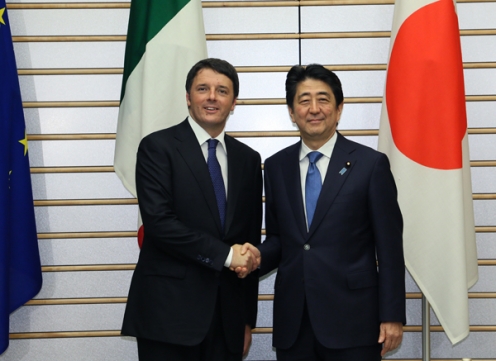
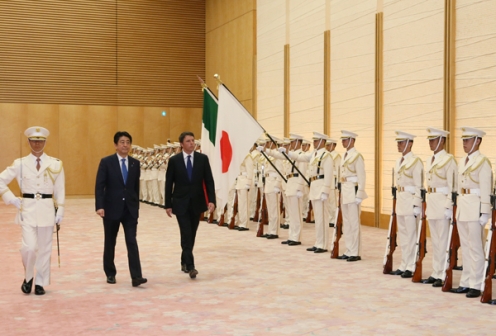
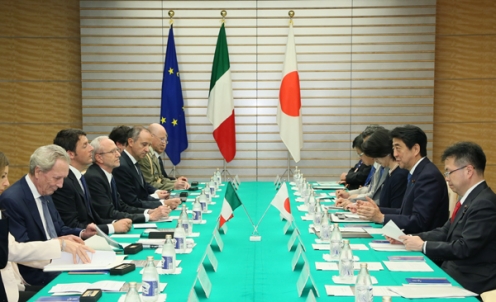

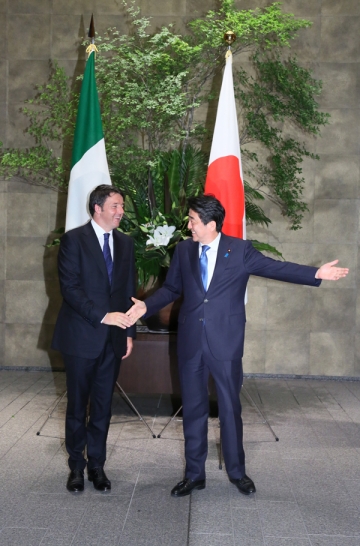
[Cabinet Secretariat] [Sunday, Aug 9, 2015]
Address by Prime Minister Shinzo Abe at the Nagasaki Peace Memorial Ceremony
[Provisional translation]
Here today, at the opening of the Nagasaki Peace Memorial Ceremony on the 70th anniversary of the atomic bombing, I reverently express my sincere condolences to the souls of the great number of atomic bomb victims.
I also extend my deepest sympathy to those still suffering from the aftereffects of the atomic bomb even now.
Seventy years have passed since the atomic bomb dropped that day reduced Nagasaki to ashes, devoid even of any vegetation. At that time some 70,000 people lost their precious lives. In this catastrophe, even those who survived were forced to live lives of hardships beyond description.
Yet despite this, the citizens of Nagasaki rose powerfully from amidst this misery to admirably build up an International Culture City blessed with World Cultural Heritage and a beautiful natural environment.
As we look around the city of Nagasaki that has achieved its present-day restoration, we appreciate once more how precious peace is. I have also renewed my determination for Japan, as the only country to have ever experienced the horror of nuclear devastation in war, to take the lead in the international community’s nuclear disarmament efforts, firmly upholding the “Three Non-Nuclear Principles” as we work towards the realization of a world free of nuclear weapons.
Especially, this year is the 70th anniversary of the atomic bombings. Regrettably, a draft final document could not be adopted at the 2015 Review Conference of the Parties to the Treaty on the Non-Proliferation of Nuclear Weapons (NPT), but Japan is determined to make even greater efforts towards realizing a world free of nuclear weapons as we continue to call for the cooperation of both nuclear-weapon States and non-nuclear weapon States. As an expression of that determination, the Government of Japan will submit a new draft resolution on the total elimination of nuclear weapons to the United Nations General Assembly this autumn.
At the end of August, the Comprehensive Nuclear-Test-Ban Treaty (CTBT) Group of Eminent Persons meeting and the United Nations Conference on Disarmament Issues will convene in Hiroshima. Not long after, the Pugwash Conference will be held here in Nagasaki in November. Then in 2016, the G7 Foreign Ministers’ Meeting will be convened in Hiroshima. Through these international meetings, we will send out our thoughts powerfully from atomic bombing sites as a message to the international community. Moreover, through world leaders and youth from around the globe becoming directly acquainted with the tragic reality of the atomic bombings, we will advance our efforts to realize a world free of nuclear weapons still further.
This year the average age of atomic bomb survivors is for the first time over 80 years old. It has also been 20 years since the Atomic Bomb Survivors Relief Law, enacted to provide support for aging atomic bomb survivors, came into effect. We will continue to develop thoroughly our comprehensive relief measures covering health and medical services and welfare.
In particular, giving consideration to the feelings of those who have applied for recognition as having an atomic bomb disease, we will expedite screenings of the applications so that recognition is granted at the earliest possible time.
I express my heartfelt prayers for the repose of the souls of the victims and my best wishes to the bereaved families and to the atomic bomb survivors, along with my sincere prayers for the inner peace of all the participants today and the people of Nagasaki City.
Shinzo Abe
Prime Minister of Japan
August 9, 2015
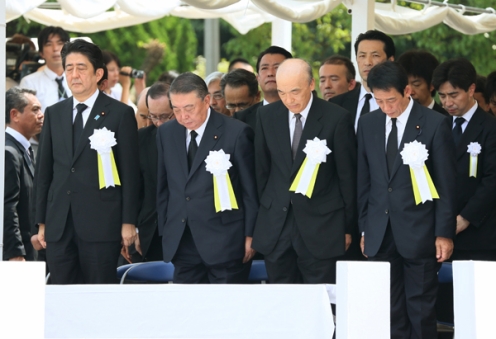
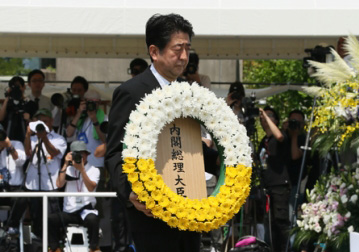
[Japan International Cooperation Agency] [Tuesday, Aug 11, 2015]
Signing of Japanese ODA Loan Agreement with the Democratic Socialist Republic of Sri Lanka
On August 11, the Japan International Cooperation Agency (JICA) signed a Japanese ODA loan agreement with the Government of the Democratic Socialist Republic of Sri Lanka to provide an ODA loan of 24.93 billion yen for the National Transmission and Distribution Network Development and Efficiency Improvement Project.
Since conflict came to an end in 2009 after more than 25 years, Sri Lanka has undergone an average annual economic growth of 7 percent, boosted by a significant growth spurt in tourism and other industries. Due to the rapid economic growth, demand for power has increased by 3.9 percent on average over the past decade, and peak demand is expected to rise continuously around Colombo which is the largest demand area.
However, since the original investment in power generation infrastructure was made, the transmission and distribution network has not been adequately updated, and the system has deteriorated substantially. The country faces the challenge of enhancing the power transmission and distribution capacity to meet the growing demand. Also, to reduce power generation costs and mitigate climate change, it needs to reduce transmission and distribution losses for improved energy efficiency.
This project will increase the capacity and efficiency of the transmission and distribution network by constructing power transmission and distribution infrastructure throughout the country, thereby contributing to a stable power supply and stimulating economic activities. In this project, the technology of low-loss transmission lines will be applied to reduce energy loss, increase energy efficiency and reduce greenhouse gas emissions. In a region nearby, the Greater Colombo Transmission and Distribution Loss Reduction Project is underway, which is expected to have synergistic effects with this project in improving the power distribution and transmission losses, and stabilizing the power supply.
Loan funds will be allocated to the public works necessary for the construction of power transmission and distribution facilities, the procurement of equipment and materials, and consulting services.
JICA will continue to support Sri Lanka to build an inclusive society toward achieving the status of an upper-middle income country by utilizing JICA’s modalities of assistance—technical cooperation, grant aid and Japanese ODA loans.
Reference
1. Terms and Amounts of Loans
* Preferential terms (fields of environment and climate change) apply to this project.
2. Executing Agency
Ministry of Power and Energy
Address: No.80 Sir Ernest De Silva Mawatha, Colombo 7, Sri Lanka
Phone: +94-11-237-0032
Fax: +94-11-256-4362
3. Planned Implementation Schedule
(i) Completion of project: April 2019 – when the facilities are put into service
(ii)Issuing of letters of invitation for consulting services (including construction monitoring):
August 2015
(iii)Tender announcement of international competitive bidding on project construction:
Procurement package title:
Construction and Improvement of Power Transmission Lines (Western Province)
Construction and Improvement of Grid Substations
Construction and Improvement of Power Transmission Lines (Central Province and North Central Province)
Construction of New Underground Distribution Cables and 33/11 kV Primary Substation
Release date: August 2016
